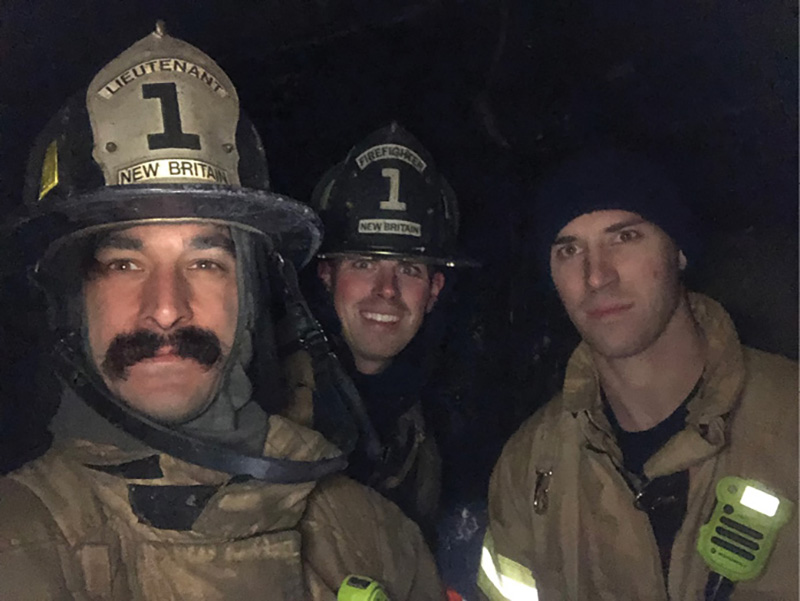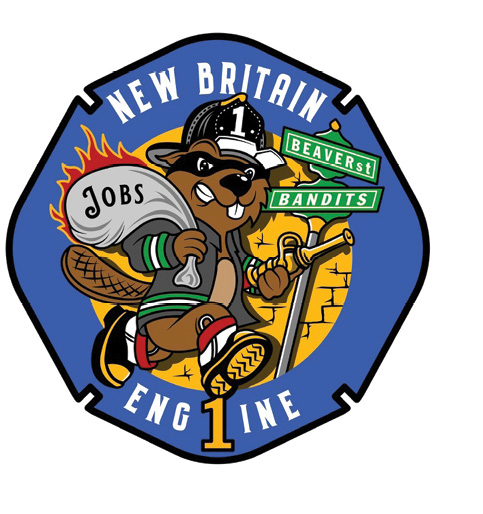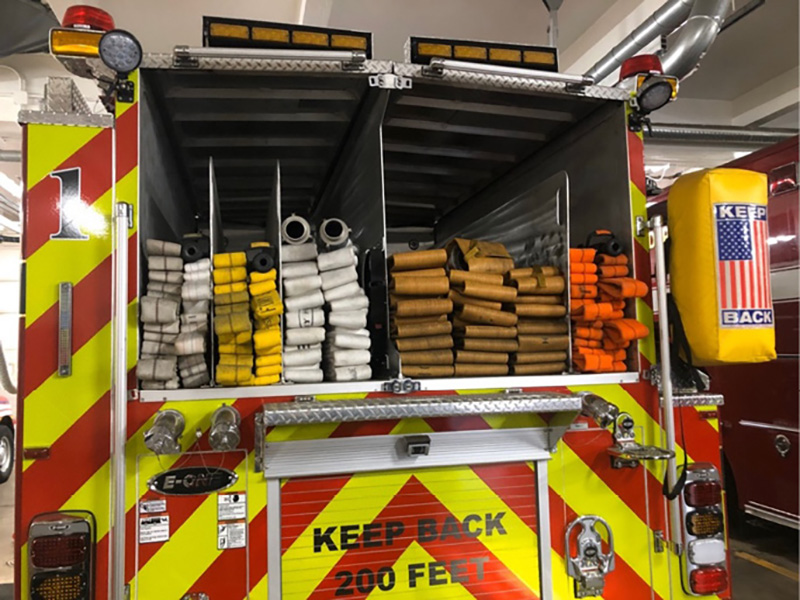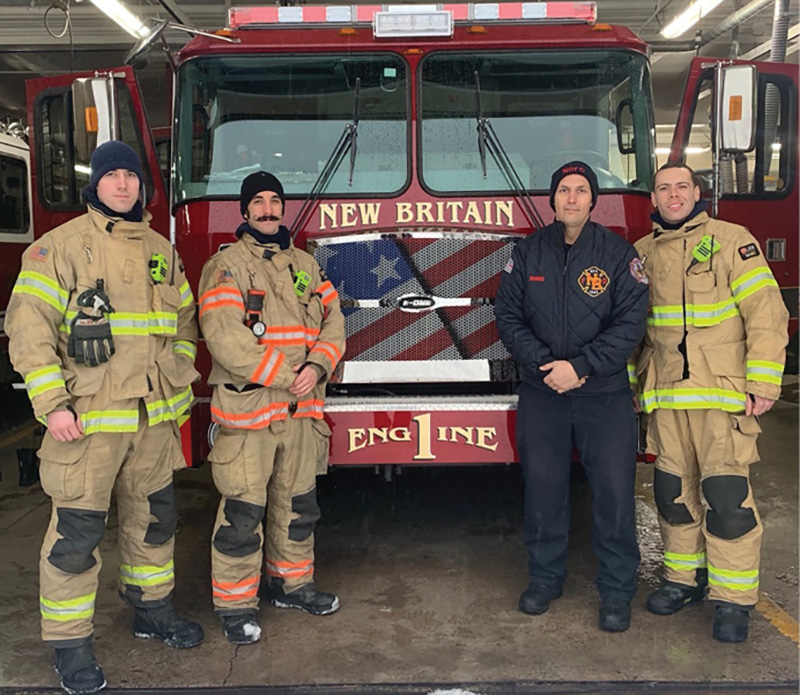BY NICHOLAS PAPA
Leading a fire company is one of the greatest privileges in the fire service, but it is also one that carries a considerable weight, often known as “the burden of command.” As a company officer, you are entrusted with the livelihood of other firefighters, a tremendous responsibility that you cannot underappreciate or take for granted. No other position in the fire service has such an immediate or direct impact and lasting influence on individual firefighters.
Whether you are a lieutenant or captain, your ultimate task is preparing those assigned to you for whatever the fireground may offer and then, when the bell hits, taking them into the fray. With the inherent dangers and uncertainty of our chosen profession, the outcome is never guaranteed. Maximizing our chances of success, however, happens through competency and readiness. While we cannot eliminate the risk, the best way for us to mitigate it is through preparation that yields consistent performance and decisive action.
In the fire service, there are no bad fire companies, only bad company officers. This fire service adaptation of the profound military adage bluntly strikes to the heart of small-unit leadership. The lieutenant or captain is the lifeblood of a fire company, setting the tone and forging its personality. Indifferent, complacent, or malcontent company officers can wreak havoc, even with the best firefighters under their command. Given an underperforming crew, the results of poor or absent leadership can be disastrous. Company officers who are motivated and passionate, however, will inspire others—even the most disenchanted. If they instill a sense of purpose and the value of preparation, the crew will, in turn, develop a mission-oriented mindset and a culture of excellence. The more the company trains and operates together, establishing its identity, esprit de corps and competitiveness will follow, breeding unit cohesion and inspiring them to be at their best.
Success in Leadership
To successfully lead a fire company, an officer’s focus must be one of service and accountability. Alternatively, those who seek to win acceptance and admiration, especially when they are newly promoted or reassigned, can fall into the trap of frivolously catering to the wants or perceived desires of their firefighters instead of fulfilling the mission and, ultimately, the community they swore to protect.
When officers lack command presence and fortitude, drifting from their responsibilities to appease their firefighters, the reverse effect can occur. The more officers cave in to these negative social pressures or temptations, the more their credibility erodes. These factors can include overlooking or undercutting training, inspections, or maintenance. Not only does the fire company and the organization suffer but, more significantly, so does the community. A fire company that lacks discipline will never achieve any degree of high performance.
Firefighters need—and truly want—to be led. They want to excel at their jobs and have their peers see them as “good firefighters.” They want to be part of a real team and to become the “go-to crew” the chief looks to and relies on. Achieving this is only possible when officers deliberately lead their fire companies with conviction.
Company officers must establish reasonable expectations that are clearly communicated and well supported and then consistently uphold them. When officers invest in their crews and treat them with respect, loyalty will be a natural by-product. Preserving and strengthening your resolve as an officer cannot be done alone. Seek counsel and guidance from those who have already walked the path so you do not needlessly struggle or fall into avoidable traps. You will find great value in reaching out beyond your department, especially if you work in a smaller organization.
When I look back at the officers I held in the highest regard, I think of the ones who demanded the most, who were unwavering in their commitment, and who pushed us to reach our full potential. This all starts with defining the mission and the very purpose of the fire company’s existence. The solemn duty and the gravity of what is at stake every day can never be forgotten. The sacred oath, which we all took, is the binding force that collectively aligns and drives a fire company to remain dedicated to achieving excellence and meeting the demands of the public in their greatest time of need (photo 1).

1. Nothing boosts morale and validates the investment of hard work more than a win on the fireground. (Photos by Gina Papa.)
Gaining Trust
Trust is the cornerstone of leadership. It is, in large part, built on company officers’ reputations and the relationships they foster, along with establishing a track record of reliability, integrity, and authenticity. Company officers can only earn trust through persistent and genuine behavior. This requires doing the right things for the right reasons, especially when no one is looking, there is no reward, or it comes at a personal risk.
To gain the trust of the people you work with, especially those within your crew/company, they must know, unequivocally, that you have their best interests in mind. It requires the company officer to be involved in the personal growth and well-being of each member. This includes providing education and training, guidance, support, and protection: leadership. You must establish legitimate relationships by truly getting to know your people: their family, home life, interests, hobbies, aspirations, strengths and weaknesses, personality, learning styles, and limitations. It is your job to understand these factors and do what is necessary to allow your people to thrive.
Caring about and empowering the members of your crew will yield genuine and lasting commitment. When the crew becomes a true team, they will follow you because they believe in you and know you will always have their backs. The best way to foster this bond is through quality time spent as a crew—sharing meals, engaging in quality/practical training that is challenging and requires teamwork, and initiatives that instill a sense of identity and belonging. One of the easiest ways you can cultivate company pride is through the creation of a logo/slogan that captures the spirit of the unit and the neighborhood it serves. These symbols should be proudly displayed on the apparatus, in the firehouse, and on uniforms (Figure 1).
Figure 1. Engine 1’s Patch

This patch can only be earned. It is a symbol of pride and a reflection of the company’s competitive and mission-oriented spirit. (Figure 1 image courtesy of author.)
Trust for a company officer is also a matter of performance—your knowledge, skills, and abilities—especially for developing the trust of those you work for, meaning the chief/command officers. Your pedigree—where you worked, how you conducted yourself, and the experiences you gained there—is a big factor in establishing trust, at least initially.
Coming from a busy company with some fire duty under your belt certainly puts you at an advantage when it comes to people trusting your judgment. At the core of instilling trust on the fireground is competency, confidence, and composure. As an officer, you must always be the calm in the storm. You need to possess the clarity of mind to accurately assess the situation; make the right call; and see that the actions taken to execute that plan are well communicated, coordinated, and controlled.
The pinnacle for you as a company officer is for your crew to be the one the chiefs always look to when there is a tough assignment on the fireground. Developing the trust necessary to earn this reputation comes down to preparation and reliability. Your company—from the apparatus to the equipment, to, most importantly, the firefighters—must be a well-oiled machine, always ready to perform at the highest level.
The Process
This process, however, takes time, energy, and perseverance, as the (never-ending) road is not straight. And it’s riddled with obstacles along the way. This is particularly true when the culture of an organization (or any major factions within it) does not collectively reflect and embrace such behavior. A fire department that does not emphasize training and operational readiness creates a minefield for those attempting to navigate the path of leadership and blaze a trail of excellence.
Regardless of these outside influences, the company officer must hold the line and remain focused on the mission, warding off complacency and, worst of all, indifference. The key to staying on track and maintaining a positive mindset is always remembering that you can only “control the controllables”—what you are responsible for. Focus on your sphere of influence and do not waste your efforts, spinning your wheels on what cannot be changed. While it will be necessary to modulate your approach, based on the personalities, capabilities, and experience levels of the individuals, you cannot compromise the standards you put in place for the crew/company.
You can enhance the performance of a company by creating routines and systems that facilitate operations and cultivate desired/productive habits. This can be as simple as conducting roll call at the start of every shift. Each morning, I greet all my firefighters on the apparatus floor after we have conducted our individual handoffs with the off-coming crew and our own equipment and apparatus inspections. This not only gives me a chance to personally check in with each of them, but it also opens the door for me to provide them with what they need to prepare for the day ahead. As I assign the members to their respective roles and responsibilities—their riding assignments—it helps align their focus with the mission. This approach also charts out the course of the day and keeps the firefighters informed on the latest operations, events, and communications.
Transparency and Inclusion
The more firefighters know about the status and inner workings of the department and, more specifically, the individual company, the less they will speculate, and fewer rumors and gripes will exist. Whenever there is latitude in the scheduling of the day’s activities, I give the firefighters a chance to decide how they would like to break it up. Appropriately making such accommodations to giving them a sense of control over their situation goes a long way and can even make the most undesirable tasks more tolerable. Whenever possible, involving the firefighters in the day-to-day operations and nonemergency decision making will improve their level of engagement and motivation. When people feel their input is being solicited/accepted—that they have “skin in the game”—they feel a sense of inclusion and ownership.
Whenever you, as the company officer, must make decisions or implement changes that impact the company, transparency is essential. By keeping firefighters in the loop and explaining the rationale behind decisions, members of your crew will feel included in the process. When they are properly briefed and can understand the why, your crew is more likely to support, or at least comply with, the new directive or initiative. As the company officer, it is up to you to lead by example and embody the very ideals you profess and the demands you put in place. Eliciting buy-in is only possible by modeling and upholding expected behavior.
Remember, the members of your crew are always watching; they will notice even the slightest missteps. While minor oversights or slip-ups are bound to happen, they must be the exception—not the rule. Each time you fail to meet expectations, your crew may perceive that such behavior is condoned or, worse, that there is a double standard, and you are not “practicing what you preach.” As such, company officers must be ever mindful of how they conduct and carry themselves. Always strive to be “squared away” (photo 2).

2. The “business end” of Engine 1, always ready for work. The hosebed of an engine apparatus speaks directly to the caliber and culture of the company riding on it.
The Importance of Training
At the heart of preparation and team building is training. While officers are responsible for executing company-level training, they must exercise humility and always remember that they will not be the most knowledgeable or experienced in every aspect of firefighting. No one expects company officers to have all the answers or to be the best at everything, but they do expect them to be honest, to find the information, and to seek out the individuals who are the most well-versed on a specific topic.
Whenever a new firefighter was assigned to my company, I always deferred the driving and pump operations training to my motor pump operator (MPO). In doing so, the new firefighters received a more practical education from the MPO. With years of experience in that role, the MPO was able to transfer tacit knowledge. This also built my MPO’s reputation/rapport with the new firefighters and further asserted his status as the “senior member.” By tapping into the talents of your firefighters in this manner, you are exhibiting trust. When firefighters, especially those more junior, are placed into positions to lead, they feel valued and empowered (photo 3).

3. Our crew in front of the new Engine 1 after putting it into service and upholding the tradition of pushing the rig into the firehouse.
Patience and tolerance are imperative for training to be successful. Firefighters must be assured that training is not punitive or judgmental and that it is intended for both their own individual improvement and that of the crew and the entire organization.
As the company officer, you must anticipate and allow for honest mistakes. The goal is to have these errors and shortcomings surface on the drill ground and not on the fireground. Whenever you see a mistake, address it immediately and honestly but also in the most tactful and constructive manner possible. Identify the cause and note any corrective and precautionary measures that will improve performance and prevent the issue from arising again. Be sure not to overwhelm anyone with feedback. Provide only one point of feedback after each evolution, focusing on the highest priority item first.
As the company officer, you must actively participate in drills not only for demonstration purposes but to level the playing field. Whenever I drill with a crew, I make sure to execute the evolution first. If a mishap occurs, I immediately own it. This shows my firefighters that it is OK to fall short in training; this is where we can expose our weaknesses and vulnerabilities and achieve true growth. Because failure has such a profound impact and can be one of the best teachers, it helps if you embrace these instances as positive learning opportunities.
The power of praise is often undervalued. Think back to what it was like to be a newer firefighter and how impactful it was to get encouragement from your lieutenant or captain. While you do not want to throw praise around meaninglessly, acknowledging a job well done goes a long way. You want your firefighters to feel appreciated and to know their worth is recognized, both individually and collectively. True leadership is about people; it is helping them to be the best versions of themselves, both on and off the fireground.
Emotional Intelligence and Relationships
Leading a fire company is so much more than command presence and tactical prowess. Good company officers possess “soft skills” and have emotional intelligence to navigate the broad spectrum of personalities they will encounter. While we are all supposed to “leave our baggage at the door” whenever we report to duty, we are only human. As a company officer, you will inevitably find yourself fielding the effects of your firefighters’ personal issues. This can include marital stressors, financial challenges, child- or health-related issues, and so much more. You must be able to quickly recognize when this is happening and know how to get people back on track so their heads are in the game.
Being able to read people, picking up on their body language and demeanor, is essential. In many cases, this just means lending an ear or offering some advice/guidance (if solicited and appropriate for the situation). If you are hearing about a complex, acute, or otherwise concerning situation, be sure the individuals are fit for duty and remind them of the options at their disposal, including the employee assistance program, peer support groups, the fire department chaplain, and licensed clinicians.
While professionalism is of the utmost importance, remember to have fun as well. Laughter truly can be the best medicine; make humor one of the “aces up your sleeve” for leadership. Inserting levity, especially during stressful or undesirable situations (where appropriate), eases tension, increases tolerance and resiliency, and improves morale.
Being a firefighter is the greatest job on earth. As a company officer, you not only get to be a firefighter but you also get to lead firefighters. Cherish every moment you have and do not squander any opportunities. Strive to make a difference every day and leave the job better than you found it.
NICHOLAS PAPA is a captain with the New Britain (CT) Fire Department, where he has served for 16 years. A second-generation firefighter, he entered the fire service in 2003, volunteering for a neighboring suburb until his appointment to New Britain. He is the author of the book Coordinating Ventilation: Supporting Extinguishment & Survivability (Fire Engineering). Papa is a member of the FDIC educational advisory board and has been an instructor since 2017. He served as a technical panelist for The Study on Coordinated Fire Attack in Acquired Structures, an FSRI research project. He is also the founder of Fireside Training, LLC.

